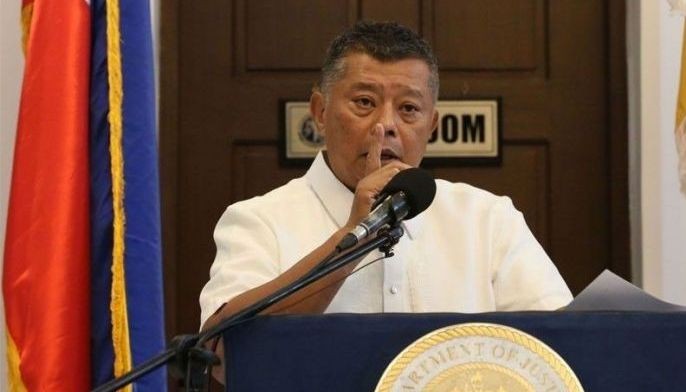MANILA, Philippines — Justice Secretary Jesus Crispin Remulla has ordered the National Bureau of Investigation (NBI) to look into possible violations of the wiretapping law by the Chinese embassy.
In a statement yesterday, Remulla said he gave the order for an “in-depth investigation” after the Chinese embassy released an alleged transcript of a conversation between its diplomat and the chief of the Armed Forces of the Philippines (AFP) Western Command regarding a “new model” for managing the Ayungin Shoal issue.
“Diplomatic immunity should never be used as a license to exploit our country’s peace and harmony for selfish motives. This privilege does not shield anyone from the consequences of the rule of Law,” Remulla said.
He added that while diplomats enjoy the privileges and immunities accorded to them, they are duty-bound to respect the laws and regulations of their host countries.
The Chinese embassy earlier said the recorded conversation was between a Chinese diplomat and Wescom chief Vice Adm. Alberto Carlos. The conversation reportedly took place last Jan. 3.
In the reported “new model,” the Chinese agreed to allow the delivery only of food and provisions to troops on BRP Sierra Madre in Ayungin Shoal, but not construction materials.
The Navy intentionally beached the Sierra Madre in 1999 so it would serve as outpost for a handful of Marines.
Under the Anti-Wiretapping Act, it is illegal to record conversations without the consent of all those participating. Secret wiretapping is also illegal without court approval.
Violators face imprisonment of up to six years and foreigners would be deported, but there is no specific provision for offenders who are diplomats.
The DOJ noted that under the Vienna Convention on Diplomatic Relations, diplomats, employees of international organizations and their immediate family members are covered by a certain degree of diplomatic immunity during their stay in a receiving state.
However, diplomatic immunity is only with respect to official acts performed in the exercise of official duties and functions necessary for advocating international comity, policies and interests, it added.
“If the Chinese embassy official is entitled to diplomatic immunity, he cannot be prosecuted but he can be expelled as persona non grata,” retired Supreme Court associate justice Antonio Carpio earlier said.
Philippine security officials are urging the expulsion of the Chinese embassy officers for violating Philippine law sand diplomatic protocols.
Meanwhile, the Inter-Agency Committee on Foreign Students (IACFS) said it wants the NBI and the National Intelligence Coordinating Agency (NICA) to make a “security assessment” on the alleged activities of spies and sleeper cells in the country.
Bureau of Immigration (BI) spokesperson Dana Sandoval said at the IACFS meeting on Monday that while they were unable to detect anything irregular with the bureau’s process of issuing student visas to foreigners, there were national security concerns that should be considered.
Sandoval did not say if the “security assessment” would be targeting a particular nationality.
“Of course they could have all the complete documents but then the national concern on sleeper cells was also raised, but that would be under NBI and the NICA already. But in terms of visa issue, they did not find anything irregular,” said Sandoval.
Sandoval said they would cooperate with the NBI or NICA in case the two agencies request for data. “We would gladly share the data as part of the inter-agency.”
It was reported last month that the Philippine National Police (PNP) is conducting background checks on Chinese students studying in Cagayan province amid speculations that they might be spies or part of sleeper cells for the Chinese military.
In an interview with Bagong Pilipinas Ngayon, Sandoval said that after the COVID-19 pandemic, they noticed an increase in the number of foreign students in the country in 2023.
The BI, NBI, NICA, the Department of Foreign Affairs and the Department of Education (DepEd) are member-agencies of the IACFS which is chaired by the Commission on Higher Education.
POGO hospital raided
In Pasay City, Philippine Anti-Organized Crime Commission raided and shut down on Monday a clandestine hospital catering to employees of Philippine offshore gaming operator (POGO) firms.
PAOCC executive director Gilbert Cruz said policemen and BI personnel swooped down on the hospital located inside the Hobbies of Asia compound on Macapagal Ave. at around 5:30 p.m.
Cruz said the operation was based on information that the hospital was operating without a license from the Department of Health.
Three doctors – two Vietnamese and a Chinese – were taken into custody. Also apprehended were a Vietnamese nurse and a Chinese pharmacist.
“They failed to show their licenses to practice as foreign professionals from the Professional Regulation Commission,” Cruz said in a message on Viber.
The suspects were brought to the BI for immigration inquest.
Two patients, a Vietnamese and a Chinese, were allowed to leave after they presented their visas. — Evelyn Macairan, Emmanuel Tupas


